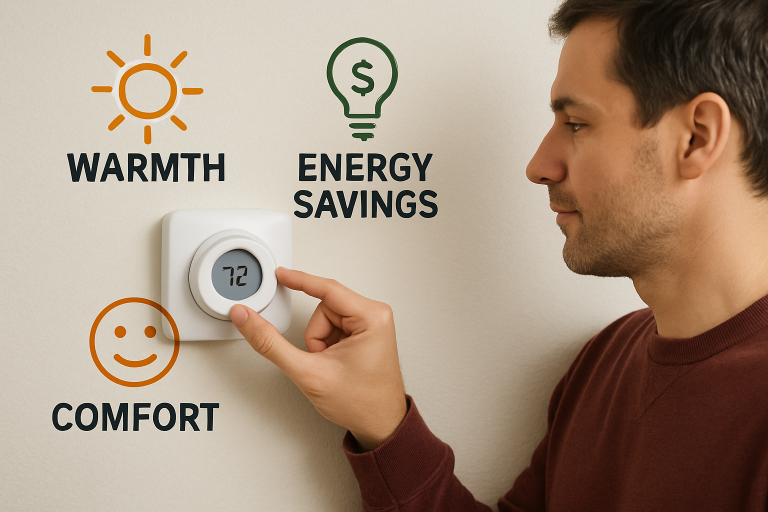HVAC
Simple Ways Homeowners Can Keep Their Heating System Running Efficiently
Table of Contents
- Introduction
- Regular Maintenance
- Air Filter Replacement
- Thermostat Management
- Sealing Leaks
- Proper Insulation
- Utilizing Ceiling Fans
- Upgrading Equipment
- Seeking Professional Assistance
- Conclusion
Maintaining an efficient heating system is crucial for keeping your home comfortable and energy bills in check during the colder seasons. By following straightforward steps and regular upkeep, you can maximize your heating efficiency, enjoy better air quality, and significantly cut down on costly repairs. For those in need of expert services or emergency repairs, AC repair in Toms River, NJ provides homeowners with access to professional solutions that help keep their heating systems functioning at their best. Adopting the right habits and being proactive with heating system care not only reduces your home’s energy consumption but also prolongs the life of your equipment. These benefits translate directly into savings and peace of mind, especially when outside temperatures drop. Whether you’re a new homeowner or a seasoned property manager, simple, ongoing maintenance practices can make a substantial difference.
The following practical strategies cover proactive maintenance, sealing drafts, updating equipment, and more. By taking these steps, you ensure a warm, efficient home environment for your family while minimizing your carbon footprint. Consistent attention to your system will ward off unexpected issues and ensure you’re not caught off guard by sudden breakdowns or escalating heating costs.
Regular Maintenance
Routine professional maintenance is essential for a reliable and efficient heating system. Have a certified HVAC technician inspect your system at least once a year before the heating season begins. These visits allow technicians to clean components, check for wear and tear, and fix minor issues before they lead to expensive repairs. According to the U.S. Department of Energy, properly maintained heating systems can reduce annual energy use by 5% to 10% compared to neglected units.

Air Filter Replacement
Replacing or cleaning your heating system’s air filters is one of the most straightforward — yet impactful — habits you can adopt. Dirty filters can block airflow, causing your system to overwork, use more energy, and circulate dust throughout your home. Most homeowners should check their filters monthly and replace them every 90 days, or more often if pets or allergies are a concern. Not only does this improve efficiency, but it also protects indoor air quality, reducing dust and allergens.
Thermostat Management
Properly managing your thermostat settings can yield significant cost savings without sacrificing comfort. Programmable and smart thermostats enable you to automate temperature adjustments based on your schedule, lifestyle, and occupancy. Lowering your thermostat 7–10 degrees Fahrenheit for eight hours a day — such as at night or while you’re away — can save around 10% a year on heating and cooling, based on estimates from Energy.gov. Set your daytime heating to 68°F while you’re home and reduce it when sleeping or out, ensuring a balance of comfort and efficiency.
Sealing Leaks
Draughts and air leaks are common culprits in high heating bills and uneven warmth. Check around windows, doors, baseboards, and even attic access points for gaps where heat may escape. Sealing these with caulk, foam sealant, or weatherstripping ensures warm air stays in, relieving your system of extra work. Similarly, examine ductwork for leaks — up to 30% of heated air can be lost through leaks in the ducts. Ensuring a tight seal lowers consumption and helps maintain even heating throughout your home.
Proper Insulation
Insufficient insulation allows significant heat loss through walls, attics, floors, and crawl spaces. Upgrading insulation spares your heating system from overcompensating. The EPA estimates that homeowners can save an average of 15% on heating and cooling bills by air sealing their homes and adding insulation. This is especially true for older properties, where existing insulation may have degraded or become inefficient.
Utilizing Ceiling Fans
Ceiling fans are not just for cooling; using them strategically in the winter can boost energy efficiency. By changing the fan direction to spin clockwise at a low speed, warm air that rises toward the ceiling is pushed back down into the living space. This recirculation can make rooms feel warmer without increasing the heating output, allowing you to keep your thermostat set lower while maintaining comfort.
Upgrading Equipment
Heating systems that are more than 15 years old are often significantly less efficient than modern alternatives. When repairs become more frequent or your utility bills keep rising despite maintenance efforts, it may be time to upgrade. ENERGY STAR® certified furnaces, boilers, and heat pumps now reach much higher efficiency standards, with some models offering annual fuel utilization efficiency (AFUE) ratings of 90% or greater. Replacing an outdated unit can result in energy savings of up to $200 per year, depending on your home and climate.
Seeking Professional Assistance
While tasks like checking filters and sealing windows can be handled by most homeowners, annual professional inspections and certain repairs require technical expertise. Certified HVAC technicians can optimize your system, check gas combustion (if applicable), and ensure all mechanical and electrical components are in perfect working order. These experts can also identify opportunities for energy upgrades, specific to your home’s design and local climate, that you might otherwise miss.
Conclusion
Overall, a proactive approach to maintaining your heating system gives you more control over comfort, cost, and efficiency. With consistent attention, you’ll experience fewer surprise breakdowns, cleaner air, and a warmer, healthier home all winter long. By prioritizing maintenance and working with trusted professionals when needed, you ensure lasting peace of mind and energy savings for years to come.
















